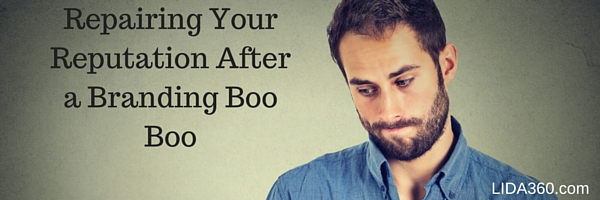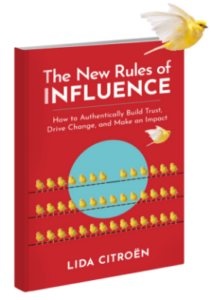“As long as the world is turning and spinning, we’re gonna be dizzy, and we’re gonna make mistakes.” — Mel Brooks

No one is infallible. As sure as we’re human, we will make mistakes. Some of those mistakes can be quietly dismissed and hidden in the cloak of night; others show up on the first page of Google with flashing neon lights surrounding them. In either case, repairing a reputation is serious, time-consuming, and important work.
When we hear of “reputation repair” situations, we often think of Martha Stewart going to jail over insider trading or Christian Bale being charged with domestic violence or Representative Anthony Weiner and his affinity for selfies of his southern region — how could we trust them again if they have flawed personalities, their judgment is questionable, and their behavior leads us to distrust their sincerity and brand?
Even non-famous people take missteps and damage their reputation. For instance, consider these branding boo boos:
- You drink too much at the holiday party and say things on a spur-of-the-moment YouTube video that your boss deems offensive.
- You attempt to reclaim your youth by dressing in your teenage daughter’s clothes, which are too small and inappropriate for your corporate job.
- In a moment of frustration, you share confidential client information with a group of colleagues, which leads your company to lose the account.
- When asked, “What makes you the right candidate for this job?” you slander your colleague with lies.
- You crave popularity and have made your life an “open book”… sometimes too open, and now you can’t put the cork back in the bottle.
- As an outspoken proponent of gender equality, you’re discovered to be sexist and discriminatory in your hiring of key employees for lead positions.
Sound far-fetched? People have lost jobs, key accounts, and elections over far less.
Your Reputation Is Everything
Other people’s perception of you is based on what they believe to be true about you and your ability to fulfill that belief. If I believe you to be trustworthy and you break my trust, I now believe you to be untrustworthy. Similarly, if I believe you to be inclusive and collaborative and I experience instances of you hiding information, refusing to delegate to others, or not supporting the success of your team, then I don’t perceive you to be inclusive, and I will resist offering you opportunities (which you may greatly desire) to grow your collaboration skills.
The way people perceive you — they way they believe you to be — greatly determines how and whether they will value you the way you desire. Your behavior is a key driver in that perception.
To build a reputation on a foundation of integrity, I recommend the Five Ds of Reputation Management:
- Discover. Uncover your current reputation. How are you known today? How do others feel about you and perceive your value?
- Desire. Think about the reputation you desire to have. What would you like to be known for? How would you like others to refer to you? Attach as much description and thought to your desired reputation as possible. This will help create the strategy to bring that vision to life.
- Define your target audience. To what group of people must your reputation be relevant and compelling? (Note: it’s not “everyone.”) Focus on learning everything you can about the audience you will promote your brand to.
- Design. Create a strategy to build toward your desired brand, focusing on the audience who must find you relevant. Put goals and benchmarks on the strategy, and consider all marketing channels as possibilities.
- Deploy your marketing strategy through social media, image, body language, messaging and communications, PR, and all of the tools available to you. Consistency and intention are key! Be the same person online as in person, stay authentic and relevant, and build your reputation over time to achieve your desired brand.
Reputation Repair Action Steps
Whether you’re a high-profile executive who’s made poor business choices or a junior professional who has burned bridges on the job, anyone can earn a negative reputation. The key is how you fix it going forward.
To proactively begin a personal brand/reputation repair strategy, follow these five steps:
1. Own Your Past
Take personal accountability, and own the choices you made which led to your damaged brand. This is a huge (and very difficult) first step. Audiences typically accept that people make mistakes and make bad choices sometimes.
2. Define Your Desired Reputation
Set a clear goal for how you want people to feel about you. It’s important to articulate what you want audiences to know about you (skilled attorney, qualified banker, etc.), because how they feel about you is vital. Do you want people to feel you’re humble, generous, and approachable? Then work toward that set of character traits in your personal brand strategy.
3. Create a Game Plan
Plan the steps you’ll need to take to rebuild your reputation. Employ experts in personal branding, public relations, social media marketing, and image consulting, if you need them. A well-planned reputation repair strategy will enable you walk confidently into the next phase of your career.
4. Set Metrics and Benchmarks
Part of your strategy will be to set benchmarks and milestones to achieve and assess your progress in repairing your reputation. Carefully analyze the reputation you’re earning (through feedback and progress toward your desired brand), and correct your strategy if you find yourself off course.
5. Get Clear on Your Values
Personal accountability, authenticity, and clarity in values are the cornerstones of every successful personal brand program. When you can articulate your values and act and live in accordance with those values, then you can earn credibility for a reputation of trust, integrity, and value to others.
Parting Words
As your personal brand grows in reach and visibility, you will need to protect that reputation tightly. Overexposure to the marketplace can lead to a decreased perception of value, whereas too much exclusivity can help your product disappear from consideration. When your offer begins to enjoy positive support and engagement from online audiences, it’s important to keep those audiences involved and excited about your brand.
Even without a Hollywood-size budget, individuals with blemished or damaged reputations can begin to repair their personal brand. It’s not easy, and not fast, but consistent behavior that lines up with values creates a strategy for successful personal brand design.
Have you ever had to repair a branding boo boo? Share how you did it in the comments!

